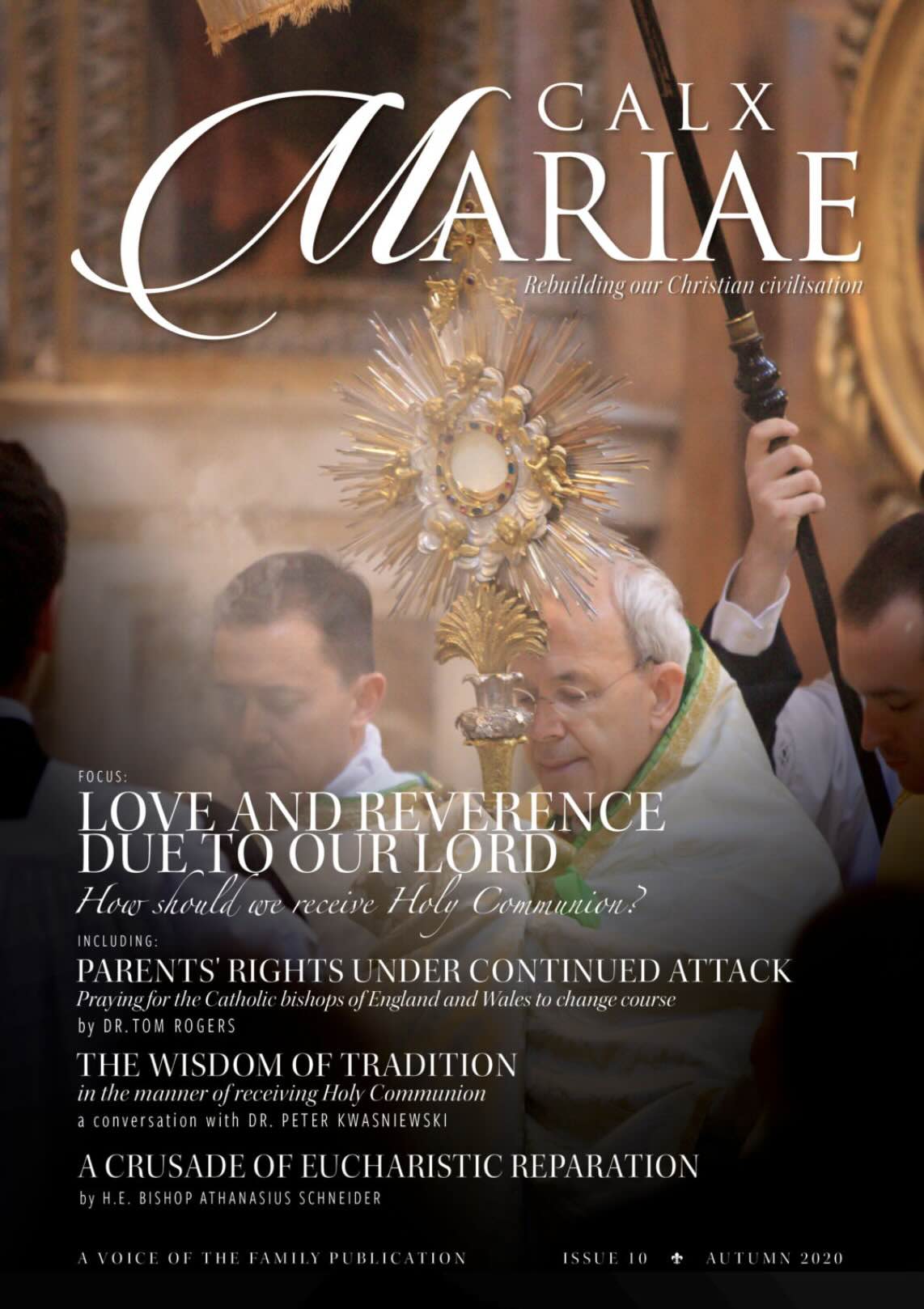Description
The pro-life movement worldwide advocates for the inviolability of human life and proudly so. Indeed, we consider it a privilege and honour to defend the most vulnerable human lives. Many in the pro-life movement are prepared to lay down their own lives for the lives of those they seek to protect. This is the strength of our commitment.
And yet there is something even more precious than the sanctity of human life, and this is the divine life truly present in the Holy Eucharist in His Body, Blood, Soul and Divinity. Our greatest treasure on earth is the Blessed Sacrament and the thought of having it so near to us in our Catholic churches fills us with gratitude and awe.
The central topic of this new edition of Calx Mariae is the reception of the Holy Eucharist, especially in the light of the regulations issued by ecclesiastical authorities during this coronavirus crisis, including guidance to receive Holy Communion in the hand. What are the laity to do in the present situation? How can we defend the Eucharist and offer Our Lord the love and reverence due to Him? How can we make reparation for sins committed against the Holy Eucharist in our churches?
We in the pro-life movement defend the reality of hidden life. We are accustomed to defending human life hidden in the womb and now we are being called upon to defend the divine life hidden in the tabernacle shown so little respect by many of those who should love Him the most. Catholics in the pro-life movement are uniquely well prepared to counter these offences.
Also, we may wonder, is it merely a co-incidence, that Communion in the hand that obscures the dignity of divine life was introduced about fifty years ago, just as abortion in many western countries that denies the dignity of human life was introduced about fifty years ago? Today we reap the bitter fruits: human life has lost its value in human society and the Body of Christ is so often abused in His churches.
And just as it is impossible to calculate the countless desecrations of the Body of Christ in the sacrilegious treatment of the Holy Eucharist brought about by the practice of Communion in the hand, it is also impossible to number the unborn children – made in the image and likeness of God – killed worldwide not only under permissive abortion legislation, but also those killed as a result of abortifacient contraceptive drugs and devices, and through IVF procedures.
The truth about the sanctity of human life before birth cannot triumph without the recognition of the truth about Jesus Christ in the Holy Eucharist.
This is why we have undertaken to study this topic, as Voice of the Family, uniting pro-life and pro-family groups from all around the world: to encourage our fellow lay Catholics to offer the love and reverence due to Our Lord truly present in the Holy Eucharist. In this issue of Calx Mariae, Fr Serafino Lanzetta offers some compelling theological reasons, why Catholics should receive Holy Communion on the tongue; Dr Peter Kwasniewski discusses the Church’s wisdom in the manner of receiving the Holy Eucharist throughout the centuries; John-Henry Westen, Alexander Tschugguel, and Theresa Habsburg give some moving personal witnesses to their love for our Eucharistic Lord. Many other insights in this issue will hopefully be helpful to you at this challenging time and above all encourage you to join the crusade to make reparation for the sins committed against the Holy Eucharist, as called by Bishop Athanasius Schneider.
Also in this edition, Dr Tom Rogers provides an updated critique of the new compulsory subjects of Relationships Education and Relationships & Sex Education (RSE) – coming into force in all English schools from September 2020 – which promote the LGBT ideology and, at secondary level, facilitate “confidential” access to contraception and abortion. Parents of secondary school children will only have “the right to request withdrawal” – headteachers will make the final decision. But due to the coronavirus lockdown, schools that wish to can delay the full implementation of these subjects until April 2021. This temporary reprieve gives us an opportunity to redirect the public debate on this harmful Government legislation aimed at corrupting our children and undermining the rights of parents, the primary educators. Dr Rogers’ outstanding analysis in this issue of Calx Mariae is a much-needed call to action, for clergy and lay faithful alike. Above all, let us continue to pray and offer sacrifices that the bishops of England and Wales will, even now, lead the resistance in this crucial battle for the lives and eternal souls of our children.






